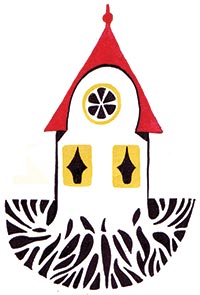During the months while he awaited news of his extradition to the United States, parades of well-wishers regularly marched through Marc Emery’s Cannabis Culture Headquarters in Vancouver. They wound their way to the modest office at the rear of the Hastings Street store, in search of the infamous crusader for the legalization of marijuana. Marc greeted them all, and offered most a trophy: a photo of themselves doing a bong hit with the Prince of Pot. He would produce an oosik-sized instrument, pack it with potent BC bud, and orchestrate the snapshot with a practised patter: inhale, smile, shoot!
Exhale. And then Marc’s fans would stagger away, all grins and giggles, to spend the next twenty minutes wandering about the store. Marc would grin, too, as he watched his blissfully dazed guests queue up to purchase Free Marc T-shirts and other pothead tchotchkes. On the day I visited his Gastown emporium, he put away the oosik, tossed off that ironic smile that has become his trademark, and deadpanned, “I do twenty to fifty of those a day.”
Home and Country
The first female politicians campaigned on a domestic platform

In the nineteenth century, women’s obligations to their families were thought to exclude them from politics: by living publicly, they would have violated their domestic imperatives. “A woman belonged in the home,” writes historian Paula Baker, “from this domain… she exercised moral influence and insured national virtue and social order.” Early female politicians learned how to use their domestic virtues for political gain, turning an argument against their civic engagement into an argument for it. As journalist Rheta Childe Dorr wrote in 1910, “Women”s place is Home… But Home is not contained within the four walls of an individual house. Home is the community. The city full of people is the Family… And badly do the Home and Family need their mother.” Ever since then, politicians from Eva Perón to Sarah Palin have campaigned as wives and mothers.
Jodie, the lithe twenty-five-year-old working at the next desk, smiled but did not look up from her computer, where she was emailing organizers of the international Free Marc effort. In addition to campaigning for his release and managing his businesses, Jodie is Marc’s wife.
“Marc has always done things differently. He’s always had a unique type of success,” she says of her husband, who has been honing the smoky art of blending business with activism since 1975, when he dropped out of high school to buy a used bookstore in London, Ontario. Thirty years later, he was making millions of dollars selling marijuana seeds via mail order. “I’ve learned how he does it, by watching, by observing. And I’ve added to it what I think I know how to do well. I think I appeal to ordinary people.”
Jodie started working for Marc six years ago. A sultry nineteen-year-old with a passion for pearl necklaces and high heels, she stood out among the usual female admirers who fleshed out his following and frequented his bed. She was, and still is, like a Mad Men character who has wandered into an episode of Weeds. Marc, who describes himself as “a serial monogamist who’s never been monogamous,” was smitten. He anointed Jodie his protege, and romance soon bloomed.
Their courtship was marked by a series of crises that brought them closer together. During the summer of 2004, Marc served sixty-one days in a Saskatoon jail. He called Jodie each day to dictate his journal; she transcribed his words for publication. “There was a lot of connecting,” she tells me later that day, pressed against her husband in a restaurant just down the street from HQ.
And on July 29, 2005, Canadian authorities raided Marc’s seed selling operation at the behest of the US Drug Enforcement Administration. Marc and two long-time employees were arrested. All three were charged in the US with conspiracy to produce and traffic in marijuana and to launder the proceeds, and faced long US sentences. Jodie remembers Marc’s next phone call vividly. “He called me from jail. He said, ‘I’m going to move in with you when I get out. And we’re going to get married at some point.’” That was the proposal. They were wed in the summer of 2006. He was forty-eight, indicted, divorced, and father to four adopted children older than Jodie. She was twenty-one and had never been in a relationship with anyone else.
Jodie describes Marc as nothing less than the man who saved her. Her father took his life when she was nine, and by the time she showed up on Marc’s doorstep she had kicked a cocaine habit but was still taking antidepressants. “I had nothing going on in my life,” she acknowledges. “It was a bad choice.” Today she is a vegetarian and a teetotaler—albeit one who smokes a lot of pot. “Some people call Marc a criminal,” she says. “I say, no, he’s a hero. That’s why I love him. That’s why I’ll always be just his wife, no matter what happens to him.”
Marc describes Jodie as both the lover who cured him of his philandering ways, and the kindred spirit who will carry on his work. In the fall of 2009, he pleaded guilty to one charge of conspiracy to manufacture marijuana after charges were dropped against his employees. As this magazine went to press, he expected to serve up to five years in a US federal prison. He has transferred control of his businesses to Jodie, effectively handing her the tough job of running a conglomerate hobbled by the loss of the lucrative seed selling business.
At the same time, Jodie is trying to launch a career in politics. She has already run in three provincial campaigns: as a candidate for Marc’s BC Marijuana Party in the 2005 general election and a 2008 by-election, and again for the Green Party of BC in 2009. After a tentative initiation, she became a star candidate for the provincial Greens, turning heads for both her pothead-in-pearls appearance and her articulate arguments. She’s slated to run for the federal Green Party in the next election.
Jodie shares her husband’s libertarian world view—“I’m very much against government, especially after reading Atlas Shrugged ”—but while Marc’s dozens of quixotic political campaigns have served primarily to promote his legalization crusade (and his businesses), Jodie wants to win: “I want to get somewhere in politics.”
Marc finds hope in her ambition and comfort in her devotion. “What do you think is the number one reason that men try to escape from jail? ” he asks. “It’s because they think their girlfriend is fooling around. They go back to the girlfriend’s place to confront her. And the cops will be waiting there.” Marc smiles at Jodie and adds, “I’ve got nothing to worry about.” Jodie leans into him, puts her head on his shoulder, and sighs.
“I’ll be defining who I am a lot more,” she says. “People will be able to see me for who I am instead of just as Marc’s wife. You know, to a lot of people I’m just a giggling, happy girl.”
This appeared in the May 2010 issue.





